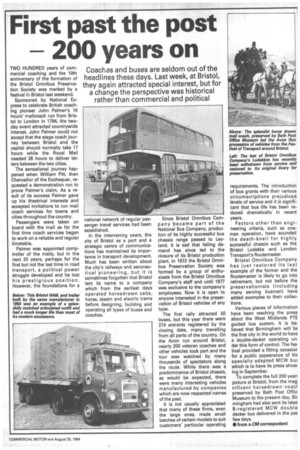First past the post 200 years on
Page 73

If you've noticed an error in this article please click here to report it so we can fix it.
Coaches and buses are seldom out of the headlines these days. Last week, at Bristol, they again attracted special interest, but for a change the perspective was historical rather than commercial and political
TVVO HUNDRED years of commercial coaching and the 10th anniversary of the formation of the Bristol Omnibus Preservation Society was marked by a festival in Bristol last weekend.
Sponsored by National Express to celebrate British coaching pioneer John Palmer's 16 hours' mailcoach run from Bristol to London in 1784, the twoday event attracted countrywide interest. John Palmer could not accept that the stage coach journey between Bristol and the capital should normally take 17 hours while the Royal Mail needed 38 hours to deliver letters between the two cities.
The sensational journey happened when William Pitt, then Chancellor of the Exchequer, requested a demonstration run to prove Palmer's claim. As a result of its success Palmer gave up his theatrical interests and accepted invitations to run mail coach services for towns and cities throughout the country.
Passengers were taken on board with the mail as for the first time coach services began to work on a reliable and regular timetable.
Palmer was appointed comptroller of the mails, but in the next 20 years, perhaps for the first but not the last time in road transport, a political power struggle developed and he lost his prestigious position. However, the foundations for a national network of regular passenger travel services had been established.
In the intervening years, the city of Bristol as a port and a strategic centre of communications has maintained its importance in transport development. Much has been written about the city's railways and aeronautical pioneering, but it is sometimes forgotten that Bristol lent its name to a company which from the earliest days operated horsedrawn cabs, horse, steam and electric trams before designing, building and operating all types of buses and coaches. Since Bristol Omnibus Com pany became part of the National Bus Company, production of its highly successful bus chassis range passed to Leyland. It is sad that falling demand has since led to the closure of its Bristol production plant. In 1972 the Bristol Omnibus Preservation Society was formed by a group of enthusiasts from the Bristol Omnibus Company's staff and until 1977 was exclusive to the company's employees. Now it is open to anyone interested in the preservation of Bristol vehicles of any type.
The first rally attracted 50 buses, but this year there were 274 entrants registered by the closing date, many travelling from all parts of the country. On the Avon run around Bristol, nearly 200 veteran coaches and other vehicles took part and the tour was watched by many thousands of spectators along the route. While there was a predominance of Bristol chassis, as would be expected, there were many interesting vehicles manufactured by companies which are now respected names of the past.
It is not usually appreciated that many of these firms, even the large ones, made small batches of certain models to suit customers' particular operating requirements. The introduction of bus grants with their various circumscriptions prejudiced levels of service and it is significant that bus life has been reduced dramatically in recent years.
Factors other than engineering criteria, such as oneman operation, have sounded the death-knell for highly successful chassis such as the Bristol Lodekka and London Transport's Routemaster.
Bristol Omnibus Company has just restored its last example of the former and the Routemaster is likely to go into retirement, but not before the preservationists (including many serving busmen) have added examples to their collections.
Various pieces of information have been reaching the press about the West Midlands PTE guided bus system. It is believed that Birmingham will Ix the first city in the world to.havE a double-decker operating un. der this form of control. The fes tival provided a fitting occasior for a public appearance of thE specially adapted MCW bw which is to have its press show ing in September.
To complete the full 200 year: picture at Bristol, from the mag nificent horsedrawn coacl preserved by Bath Post Offici Museum to the present day, Bir mingham had also sent its lates B-registered MCW double decker bus delivered in the pas few days.
• from a CM correspodent












































































































